




To the greatest blessings of my life: my wife, Judy; my children, David, Daniel, and Sara; and my grandchildren, be they many
Acknowledgments
 HIS MEMOIR WOULD NOT HAVE BEEN WRITTEN were it not for the determination of Karen Cook who, in addition to keeping a keen eye on my investments, managed to harass, cajole, humor, and in general intimidate me into writing it. For her tireless energy and persistence and, perhaps more important, with this book at long last completed, I truly thank her.
HIS MEMOIR WOULD NOT HAVE BEEN WRITTEN were it not for the determination of Karen Cook who, in addition to keeping a keen eye on my investments, managed to harass, cajole, humor, and in general intimidate me into writing it. For her tireless energy and persistence and, perhaps more important, with this book at long last completed, I truly thank her.
I am grateful to the people at Wiley, particularly my editor, Pamela van Giessen. Arthur Klebanoff of Scott Meredith Literary Agency was instrumental in getting this project off the ground and keeping it so. I would also like to thank Paul Alexander for providing early inspiration and guidance.
Lastly, I would like to thank my family, friends, and coworkers for their patience, insights, and even for their often ignored criticisms.
M. S.
Contents
NO
BULL
0
 OR SOME TIME, DURING MY EARLY FORTIES, I could not figure out why I often became depressed in the fall. Then I realized that this season was both the beginning and the end of a year for me. The school year started, and Rosh Hashanah, the Jewish New Year, followed, creating a feeling of hope, of new beginnings. But, before the Internal Revenue Service changed the rules for money managers and made the fiscal year coincide with the calendar year, my firm's fiscal year ended in September. Much of my life's focus has been on my performance as a hedge fund manager, and this focus took on a particular intensity as the close of the trading year approached. When my fiscal year ended each September 30, I felt a sense of closure and finalitythe end of the play. Any good theatrical play has its beginning, middle, and end, or finale. My finale was September 30.
OR SOME TIME, DURING MY EARLY FORTIES, I could not figure out why I often became depressed in the fall. Then I realized that this season was both the beginning and the end of a year for me. The school year started, and Rosh Hashanah, the Jewish New Year, followed, creating a feeling of hope, of new beginnings. But, before the Internal Revenue Service changed the rules for money managers and made the fiscal year coincide with the calendar year, my firm's fiscal year ended in September. Much of my life's focus has been on my performance as a hedge fund manager, and this focus took on a particular intensity as the close of the trading year approached. When my fiscal year ended each September 30, I felt a sense of closure and finalitythe end of the play. Any good theatrical play has its beginning, middle, and end, or finale. My finale was September 30.
Fortunately, because I enjoyed success as a hedge fund manager throughout my career, September 30 was usually a good time. Congratulations, excitement, and joy filled the day. My investors, partners, and employees were happy. We often had superior performance-in some years, the best performance on Wall Street-and everyone usually made too much money.
But in October it all started again: the uncertainties, the insecurities, the worry about good performance. At the beginning of each new fiscal year, I had to start from scratch. What I, or any other money manager, had done in the past was soon "ancient history" because at the core of the competitive hedge fund world lurked a perennial question: "How much have you made for me this year?" or sometimes: "How much have you made for me this month? This week?" Each October, I felt a particular angst about having to start the performance all over again.
Traditionally, the window between the old and the new also provided an opportunity to take a short vacation. Things were no different in the fall of 1981.
After a brief visit to Israel, my wife Judy and I flew to the South of France, where we planned on staying at one of my favorite hotels, La Reserve de Beaulieu. The hotel appealed to me largely because of its cuisine. For me, dining is one of life's unmitigated pleasures. For days before arriving on the Cote d'Azure, I would fantasize about past meals: scampi Provencale with wonderful garlic aroma, the delicate, foie Bras, or the loupe de mer with fennel, which seemed to lift fish into an ethereal realm. This part of the world drew other people because of its scenic beauty (including the garb, or lack thereof, of the women), but the most exciting element for me was the menus. As Judy would remind me in her rare angry moments, I often had problems remembering details in more important areas of life, but when it came to menus, my facility for recall was outstanding.
We arrived in Beaulieu-sur-Mer late in the afternoon-happily, in time for the dinner hour. The flight had exhausted us so we decided to rest before our much anticipated culinary adventure. Just as we stretched out on the bed and began to enjoy the balmy October afternoon, the telephone rang. The hotel operator informed me that my assistant, Samantha, was calling from New York.
When I picked up the receiver, Sam, as I called her, told me she had received a call from an FBI agent. She gave me his number. He had told her to have me call him as soon as possible; she did not know why he was calling. It sounded urgent, so I said I would call him the minute we hung up. Before I got off the line, however, I asked to speak to one of my senior partners, John Levin. His first words to me, without even a hello, were: "Congratulations! The bonds have made a huge move. We're up 60 percent for the year." And the fiscal year had just started!
I knew the bond market had turned, but the magnitude of the move and its impact on our portfolio stunned me. Sitting on the side of the bed, I felt tremendous satisfaction in having been right, and having done so in an investment arena that was entirely new to me-the bond market. Since the age of 13, stocks had held a magical fascination for me. From amateur investor to professional, from analyst to trader to chief portfolio manager, my expertise had been in the stock market and my career had focused exclusively on stocks. The investment climate of the early 1980s, however, had created an extraordinary opportunity-better than any alternative, including stocks-in the bond market.
At the start of the 1980s, spiraling inflation, and the need to control it, plagued the U.S. economy. The federal government was running a huge deficit-enough to consume 2.5 percent of the nation's economic output. Longterm Treasury rates rose from about 10 percent in 1980 to almost 16 percent by September 1981. Shortterm interest rates rose to 17 percent. Using "monetary policy"-mostly interest rate pressurethe chairman of the Federal Reserve, Paul Volcker, attempted to curb inflation but had had little success to date.
During the same period, Henry Kaufman, chief economist at Salomon Brothers (a man affectionately referred to as "Dr. Doom"), accentuated fixed-income fears with his dire predictions of record-high interest rates and runaway inflation. Most other economists on Wall Street were equally bearish on bonds-they referred to them as "certificates of confiscation"and felt that inflation would continue to increase on both cyclical and secular bases. Oil prices were high and were predicted to continue rising.
I viewed things differently.

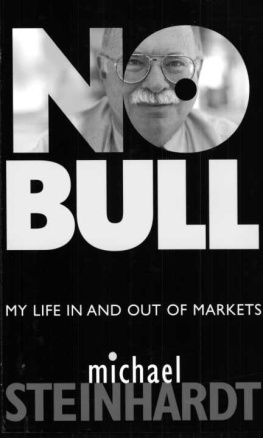

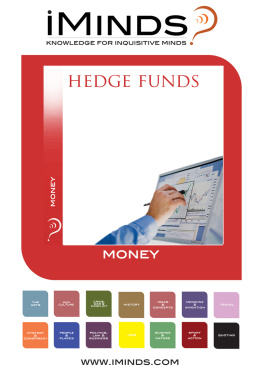
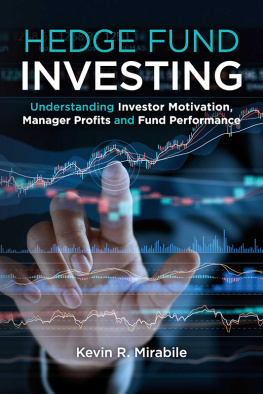
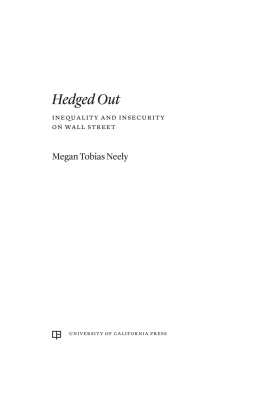

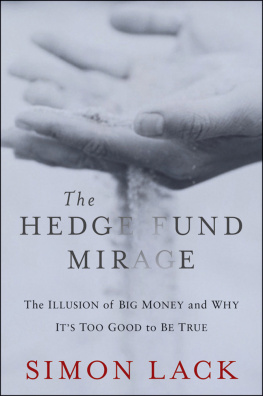
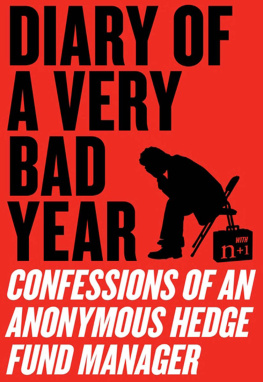
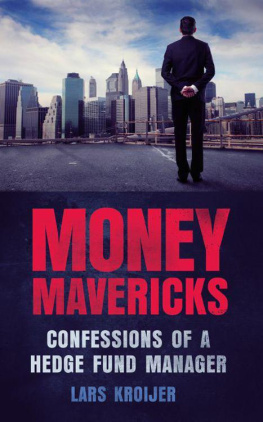
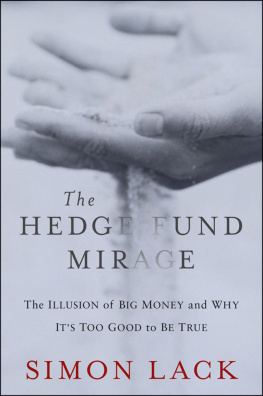


 HIS MEMOIR WOULD NOT HAVE BEEN WRITTEN were it not for the determination of Karen Cook who, in addition to keeping a keen eye on my investments, managed to harass, cajole, humor, and in general intimidate me into writing it. For her tireless energy and persistence and, perhaps more important, with this book at long last completed, I truly thank her.
HIS MEMOIR WOULD NOT HAVE BEEN WRITTEN were it not for the determination of Karen Cook who, in addition to keeping a keen eye on my investments, managed to harass, cajole, humor, and in general intimidate me into writing it. For her tireless energy and persistence and, perhaps more important, with this book at long last completed, I truly thank her. OR SOME TIME, DURING MY EARLY FORTIES, I could not figure out why I often became depressed in the fall. Then I realized that this season was both the beginning and the end of a year for me. The school year started, and Rosh Hashanah, the Jewish New Year, followed, creating a feeling of hope, of new beginnings. But, before the Internal Revenue Service changed the rules for money managers and made the fiscal year coincide with the calendar year, my firm's fiscal year ended in September. Much of my life's focus has been on my performance as a hedge fund manager, and this focus took on a particular intensity as the close of the trading year approached. When my fiscal year ended each September 30, I felt a sense of closure and finalitythe end of the play. Any good theatrical play has its beginning, middle, and end, or finale. My finale was September 30.
OR SOME TIME, DURING MY EARLY FORTIES, I could not figure out why I often became depressed in the fall. Then I realized that this season was both the beginning and the end of a year for me. The school year started, and Rosh Hashanah, the Jewish New Year, followed, creating a feeling of hope, of new beginnings. But, before the Internal Revenue Service changed the rules for money managers and made the fiscal year coincide with the calendar year, my firm's fiscal year ended in September. Much of my life's focus has been on my performance as a hedge fund manager, and this focus took on a particular intensity as the close of the trading year approached. When my fiscal year ended each September 30, I felt a sense of closure and finalitythe end of the play. Any good theatrical play has its beginning, middle, and end, or finale. My finale was September 30.